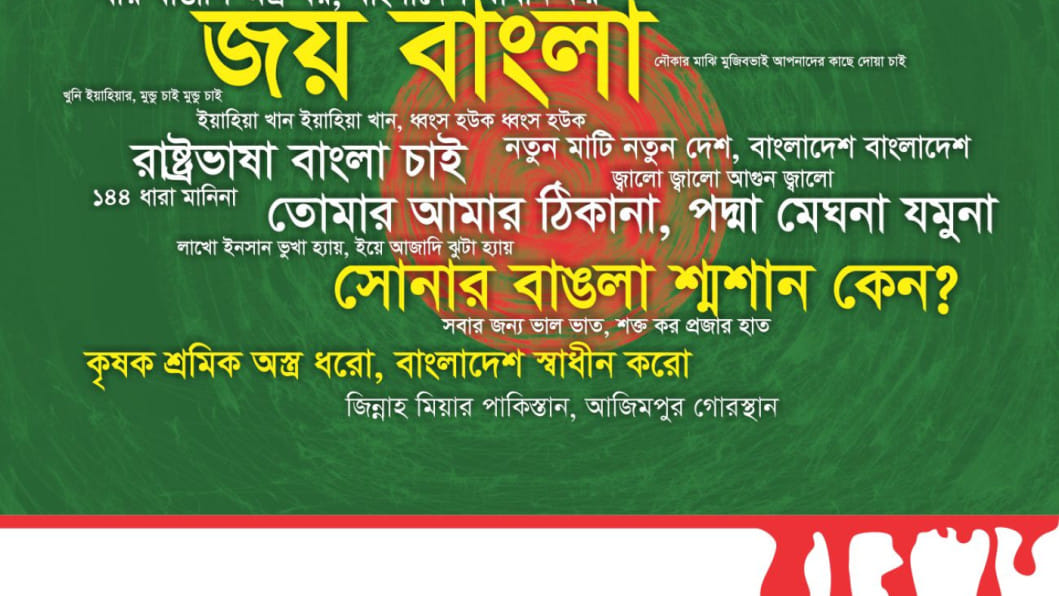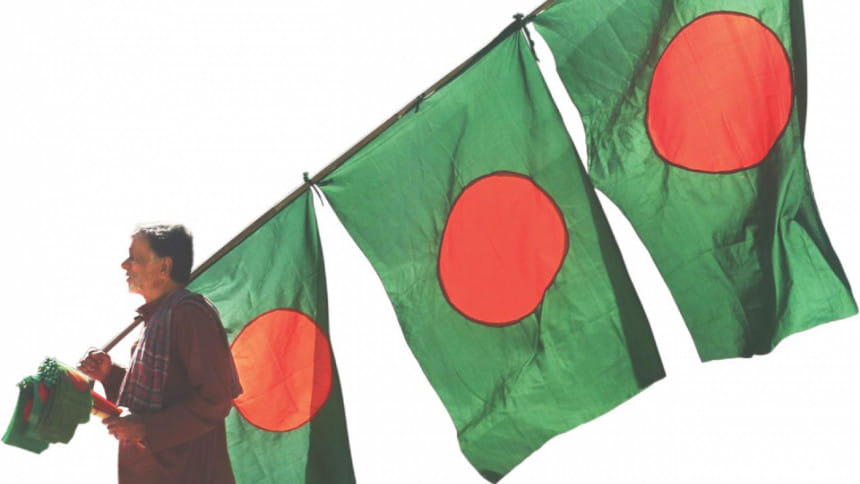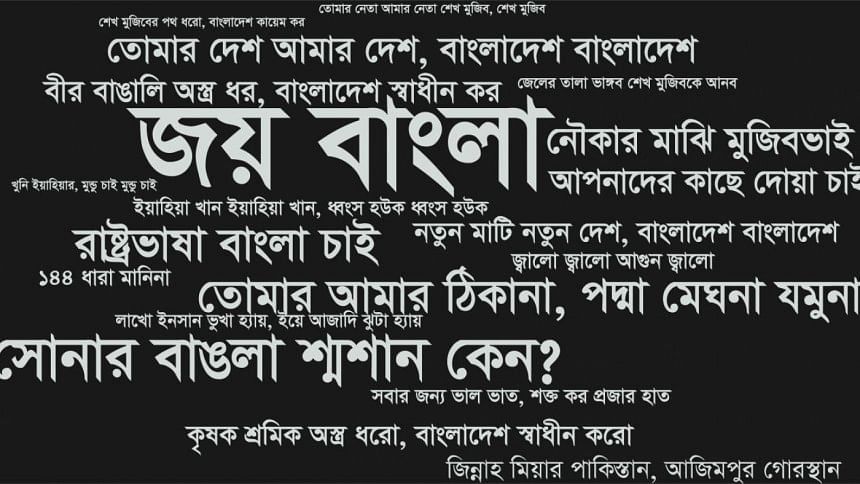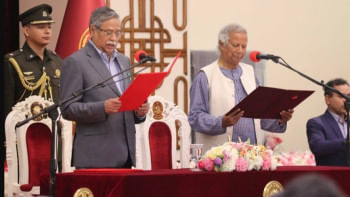ROAR!

They shake the earth. They ignite fire. They can shatter barriers, shift paradigms, and flip the status quo. Whenever demands of people go unheard, people unite and their voices echo into a singular unified form - a slogan.
The chequered history of Bangladesh is dotted with revolutions and movements and of course, the War. It is therefore only natural that slogans have emerged, and narrate the saga of the struggle of our previous generations - the oppression, the burning desire for freedom, the patriotism.
On the occasion of the upcoming Victory Day, Star Lifestyle presents three versions of a single, united narrative.
'Joy Bangla' is a tale about slogans of freedom through the ages; 'Jinnah Miar Pakistan, Azimpur Gorosthan' talks about slogans centred around particular individuals, indicating our love and hatred for them; whilst 'Bangladesh! Bangladesh!' puts the spotlight on the youth of today and how they are discovering and rediscovering slogans.
Read - and roar!
By M H Haider
Information sources of the write-ups include 'Mass Movement in Bangladesh: Slogans, Placard and Poster' by Md Siddikur Rahman Swapon, and Banglapedia, the National Encyclopedia of Bangladesh.
Jinnah Miar Pakistan, Azimpur Gorosthan!
Revolutions are not without heroes. Revolutions are not without villains either. In fact, a revolution is a saga of heroes and villains, a battle between 'good' and 'evil'.
Bengalis have brewed up many uprisings through the ages. And the deep love and admiration for our leaders, and the burning desire for annihilation of those loathed, have been expressed through slogans.
Let's start with leadership. Bangabandhu Sheikh Mujibur Rahman is of course one of the biggest champions of our freedom. And slogans point to that.
In 1968 he was implicated in Agartala Conspiracy Case, where the government of Pakistan accused him and several others of sedition. 'State vs Sheikh Mujibur Rahman and Others', the case took the official name. The accused were imprisoned in Dhaka Cantonment.
By that time, Sheikh Mujibur Rahman was already a popular leader among the people of East Pakistan; always fighting for their rights, igniting the rebel in them, and demanding their autonomy through the Six-point Movement.
'Jail er taala bhangbo, Sheikh Mujib ke anbo', the streets of Dhaka roared. The demand for freedom of their favourite leader, and all others imprisoned, did not go unsuccessful: on 22 February of the following year, the case was dismissed and all prisoners freed.
Bangabandhu Sheikh Mujibur Rahman went on to compete in the general election of 1970. Under the banner of Awami League, with the Boat as the party symbol, Mujib campaigned for the election. During this time, slogans like 'Gacher agai pokkhi, Sheikh Mujib lokkhi' and 'Noukar majhi Mujib bhai, apnader kache doa chai' were seen and heard.
Mujib won an overwhelming victory in East Pakistan. However, Yahya Khan, President of Pakistan, postponed the National Assembly session for an indefinite period.
This announcement enraged the Bengalis, who poured onto the streets, expressing their disgust through slogans. Words of hatred saturated the air, despising the founder of Pakistan Muhammad Ali Jinnah and protesting against Yahya. 'Jinnah miar Pakistan, Azimpur Gorosthan'. 'Yahyar ghoshona, Bangali maney na' .
Slogans like 'Khuni Yahyar, mundu chai mundu chai' reflect the hatred for Yahya.
The oppression, political and cultural disharmony, and the violence eventually led to the Liberation War.
A people, dreaming a shared dream of a free land, united by their leader, took up arms: 'Tomar neta amar neta, Sheikh Mujib Sheikh Mujib'.

Joy Bangla!
It was brickbats versus teargas. The clash between the infuriated mob and the police was in full swing. Violation of Section 144 was in place. Students took to the streets. It was absolute disobedience.
But when it came to 'Urdu and only Urdu' as the state language, Bengalis had to oppose. The streets reverberated with the demand, 'Rashtro bhasha Bangla chai'. When Section 144 was imposed, the students replied with 'Eksho Chuallish dhara manina!'
The protestors - defiant, fearless, and relentless were out of control, a chaos the police decided to stop by opening fire. It was 21 February, 1952...
'They' wanted only Urdu; 'We' demanded that Bengali be added as a state language as well. At the cost of several lives, we earned for our mother tongue the recognition it deserved.
Whenever a scheme to play with the identity of the Bengalis was plotted, whenever our freedom was at stake, and whenever a pang of oppression hit the people, we stood united and fought the opposing force. The Language Movement is a landmark of this quality of Bengalis.
For Bengalis, the dismissal of British imperialism paved the way for a new form of colonisation. East Pakistan had been oppressed, and the vision of an independent entity was becoming clear.
1960s were turbulent times. If one could physically visit the '60s as a corridor of the past, he would hear that corridor echoing many slogans loudly - 'Jaalo jaalo agun jaalo' and others.
Autocracy and oppression had ignited the rebels. To survive with dignity, to ensure our rights; for autonomy, six demands were put forward, and placards supporting the Six-point Movement were held high.
'Bangalir daabi cho-dofa'; 'Bachbar daabi cho-dofa'.
And an awakening of people was necessary to fight against injustice.
'Jaago jaago Bangali jaago'.
Without an awakening of people, change is not possible. The struggle for freedom was not merely the agenda of an elite group of politicians. It was a struggle of the farmers and labourers. It was the fury against oppressors. It was a voice of the students. It was the cause which brought seas of men and women onto the streets.
'Krishok sromik ostro dhoro, Bangladesh shadhin koro'.
'Bhuttor mukhe lathi maro, Bangladesh shadhin koro'.
'Basher lathi toiri koro, Bangladesh shadhin koro.'
The agenda of the common people was, 'Bangladesh shadhin koro'.
The idea of an independent Bangladesh became the dream which united people:
'Tomar desh amar desh, Bangladesh Bangladesh.'
And then the demons - in the darkness of the night of 25 March, 1971 - carried out the horrendous massacre, coded as "Operation Searchlight". The people of Bangladesh took up arms to 'Annihilate these Demons'.
'Bir Bangali ostro dhoro, Bangladesh shadhin koro'.
The glorious Liberation War had begun.
'Joy Bangla!,- the freedom fighters had chanted. The 'Joy Bangla' slogan, which essentially means 'Victory to Bengal' was the mantra, a source of inspiration, a war-cry, and even a greeting.
And 'Joy Bangla' was heard on Victory Day, too. A people had reached its destiny.
The slogan predates 1971, of course. Looking back now, it may be argued that this slogan is a two-word summary of all that we stood for, reflecting our emotions of patriotism, passion and anger.
According to the interview of Bangabandhu Sheikh Mujibur Rahman in Dawn newspaper he said that Joy Bangla was "... not a political slogan". Rather, it "...was a slogan for autonomy, economic and social freedom..." of our country.
Even after such a glorious victory, the democracy-loving people of independent Bangladesh have tasted the bitterness of autocracy from time to time.
The 1980s, to illustrate, saw a nation stand against the dictatorship of Hussein Muhammad Ershad. 'Shoirachar nipat jak', the calling of the heart surfaced in the form of words, painted on the chest of protester Noor Hossain.
Arguably, the history of Bangladesh can be narrated through slogans, as they stand as a reflection to the oppressions and revolutions throughout the ages.
The illustrious activist Noor Hossain - who had the slogan painted on his chest - was killed, becoming yet another martyr
of our land.
If blood is the cost of freedom, then be it.

Bangladesh! Bangladesh!
Eyes of an entire nation were fixed on the television screen. It was ICC Cricket World Cup 2015, and Bangladesh was playing a match against England. The winning team would qualify for the quarterfinals, and the loser would bow out of the tournament; it was an important game indeed.
Tasnuva, a student of Dhaka University, was watching the game at her campus. 'Bangladesh! Bangladesh!,' the slogan of patriotism went. "The thrill, the anxiety was too much to bear," Tasnuva remembers. "We desperately rooted for our country to win."
And victory it was. With hundreds of others, she witnessed Bangladesh cricket team create history by making it to the quarterfinals for the first time in World Cup.
The youth of today has not seen the raging '60s, neither did they witness the Liberation War. Many of them have no memory of the anti-Ershad movement of the '80s, either. Patriotism, nevertheless, in some form or another, is evident among them, and in one of the cases it bursts out is during these cricket matches.
With thousands of people chanting 'Bangladesh Bangladesh!' or 'Joy Bangla!' the ambience at the gallery of a stadium becomes electrifying. "There is an effect of a large gathering of people, packed together, chanting the same words, rooting for the same thing," Tasnuva said.
Another such occasion was during the 2013 Shahbagh protests. The verdict of the International Crimes Tribunal, which sentenced razakar Abdul Quader Mollah to life imprisonment instead of announcing capital punishment, infuriated the people of Bangladesh.
Gonojagoron Moncho demanded the death of war criminals. "Shahbagh became a sea of numerous thousands of people. It was sheer magic; the air was thick with energy," Tasnuva says.
"Tui rajakar! Tui rajakar!" Shahbagh roared. Borrowed from the mouth of a parrot in Humayun Ahmed's drama, Bohubrihi, 'tui rajakar' became one of the slogans of Gonojagoron Moncho.
The movement also repeated earlier slogans of Bangladesh, like 'Tomar amar thikana, Padma Meghna Jamuna'. Indeed. Many slogans become immortal, outliving generations.
Our forefathers have chanted slogans against oppression, slogans to establish an identity, slogans of freedom. We have been handed down a glorious history and a free nation. It is now up to us to raise those placards high, and make new ones, and march towards a better tomorrow.
Photo: Prabir Das

 For all latest news, follow The Daily Star's Google News channel.
For all latest news, follow The Daily Star's Google News channel. 



Comments